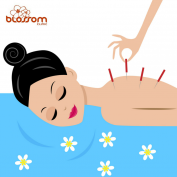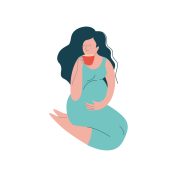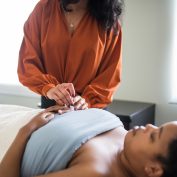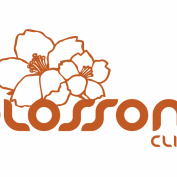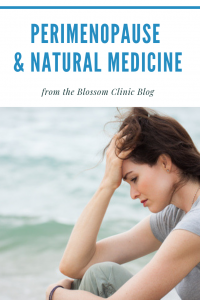Are you feeling overwhelmed? Snapping more quickly at your kids? Do you find yourself crying over little things? Are you tired at the beginning of your day after a night spent tossing and turning, or waking in a sweat? Perhaps you’re having trouble losing weight, something that’s never happened to you before. Maybe you feel like you have horrible PMS that never ends. You might be having hot flashes or vaginal dryness. These can all be a part of perimenopause.
What is Perimenopause?
Officially, the definition is the period of life for a woman from around 35 years of age until they stop menstruating (Menopause). That covers a lot of ground.
Perimenopause is simply a time of change. It requires shifting, adapting, finding a new place of balance. Your body is getting ready to wind down the process of reproduction so it can divert its energies to different endeavors. As it does this, your hormone levels will often be all over the place. The good news is – eventually, you will find a renewed sense of energy and mental focus. But in the meantime, you may feel crappy, exhausted and out of sorts.
Symptoms of perimenopause can show up even for women in their 20s if they are under a lot of stress – finishing law school, starting a demanding career, working 2-3 jobs to support their family, etc. But for most women it happens later, sometime in the 30s or 40s. At anytime, it is a sign of imbalance. We all go through this, but how you prepare for it or respond to the changes determines how you’re going to feel.
Chinese Medicine and perimenopause
Chinese medicine has been long been used to help navigate these years of change. Acupuncture and herbs can even out hormonal swings. Night sweats and hot flashes, insomnia, low libido, weight gain, acne, fatigue, brain fog, memory challenges and headaches are some of the symptoms that respond to treatment. Bad PMS; painful, heavy or irregular periods are all signs your hormones are out of balance. Your periods shouldn’t be draining. Excessive menstruation should always be checked out by your gynecologist, since it can be a result of some types of cancer. But heavy bleeding from hormonal imbalance or fibroids often responds well to Chinese medicine and can help you avoid surgery. Acupuncture adjusts hormone levels by working through the nervous system, helping your body self-regulate.
Herbs can keep your body cooler. Some women find they can have a glass of wine a few times a week with no hot flashes as long as they take their herbal formula regularly. Who doesn’t want to continue their lifestyle as much as they can? Cutting out all alcohol may not be high on your list. In that case adding in support with acupuncture and herbs may be the way to go.
Typically, a weekly acupuncture treatment to get things calmed down is a good beginning. Women usually begin to see benefits within 3 to 4 weeks. Treatments are spaced out as you begin to feel better. Eventually, acupuncture once every month or two may be all that is needed to keep you centered and comfortable.
Things you can do for perimenopause
- Support yourself by getting enough rest. Make it a goal to start going to bed an hour earlier than you usually do.
- Take short breaks at work. Just a 10 minute walk can clear your head and get blood flowing.
- Take time off. Schedule real vacations = not checking into work every day you’re away.
- Don’t miss out on exercise because it’s rejuvenating, good for your brain as well as your body and will help keep you balanced. Burst training takes very little time, fun dance classes, yoga – whatever works for you.
- Drinking enough water is pretty easy to do and also very important. Dehydration happens before you start to feel thirsty; causing more headaches, body aches, constipation, allergy symptoms, drier skin and hair.
In Chinese astrology 2019 is the Year of the Pig, a double Yin year, when people are encouraged to stay home and spend time with family and friends, eat good food, tend their gardens, and make a comfortable home environment. It is a year when it will be very easy to gain weight, so balance starchy foods with lots of fruits and vegetables, and cooked foods with raw. Eat sweets in small amounts. Dark chocolate or non-dairy ice creams like Coconut Bliss are some healthier treats.
What not to do for perimenopause
- Working 10-12 hours a day, or on a deadline with no days off will make symptoms worse.
- Staying up late (for work or pleasure) causing you to miss out on hours of sleep that your body really needs is guaranteed to set you back.
- Drinking lots of alcohol, or having 2 to 3 drinks every night, using alcohol to unwind doesn’t really work. You may fall asleep more easily but you will not get a good night’s sleep. Alcohol causes cortisol to rise in the middle of the night. This will either wake you or promote very restless sleep. Once awake it’s often hard to fall back.
- Saying yes to everything – keep some time for yourself, hard to do if you’re a busy mom but so essential for your health! Remember, if you feel better your family gets a better version of you.
Perimenopause is a time of transition that can be smoother or difficult. If you choose to make some adjustments, paying a bit more attention to what throws you off balance – life can get better. But if you continue to push through ignoring the warning signs, doing what you’ve always done – you may end up stretched too thin, physically, emotionally and spiritually.
At Blossom we are always available to answer questions. Contact us by phone or email to set up a phone consult. We look forward to helping you feel your best!
by Janene Mitchell, LAc, FABORM
Effects of acupuncture on hot flashes in peri menopausal and post menopausal women-a multicenter randomized clinical trial; Kim, Kun Hyung OMD, et al; Menopause: March 2010, Volume 17, Issue 2, p 269-280
Management of Menopause Symptoms with Acupuncture: An Umbrella Systematic Review and Meta-Analysis; Deanna Befus et al; The Journal of Alternative and Complementary Medicine, Volume 24, No. 4
Chinese herbal medicines for the treatment of non-structural abnormal uterine bleeding in perimenopause: A systematic review and a meta-analysis; Yujie Shang et al; Complementary Therapies in Medicine, Volume 41, December 2018, Pages 252-260
A randomized, double-blind, placebo-controlled trial of Chinese herbal medicine granules for the treatment of menopausal symptoms by stages; Fu, Shu-fei MD et al; Menopause; March 2016, Volume 23, Issue 3, P. 311-323

